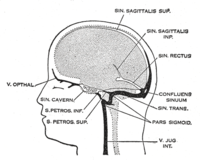
Photo from wikipedia
Abstract Platelets may be a target of bacteria and viruses, which can directly or indirectly activate them so promoting thrombosis. In accordance with this, community-acquired pneumonia (CAP) is complicated by… Click to show full abstract
Abstract Platelets may be a target of bacteria and viruses, which can directly or indirectly activate them so promoting thrombosis. In accordance with this, community-acquired pneumonia (CAP) is complicated by ischemia-related vascular disease (myocardial infarction and stroke) in roughly 10% of patients while the incidence of venous thrombosis is uncertain. In CAP platelet biosynthesis of TxA2 is augmented and associated with myocardial infarction; however, a cause-effect relationship is still unclear as unclear is if platelet activation promotes thrombosis or functional changes of coronary tree such vasospasm. Retrospective studies suggested a potential role of aspirin in reducing mortality but the impact on vascular disease is still unknown. Coronavirus disease 2019 (Covid-19) is complicated by thrombosis in roughly 20% of patients with an almost equivalent localization in arterial and venous circulation. Platelet activation seems to have a pivot role in the thrombotic process in Covid-19 as consistently evidenced by its involvement in promoting Tissue Factor up-regulation via leucocyte interaction. Until now, antiplatelet treatment has been scarcely considered for the treatment of Covid-19; interventional trials, however, are in progress to explore this issue. The aim of this review is 1) to compare the type of vascular diseases complicating CAP and Covid-19 2) to assess the different role of platelets in both diseases and 3) to discuss if antiplatelet treatment is potentially useful to improve clinical outcomes.
Journal Title: Platelets
Year Published: 2021
Link to full text (if available)
Share on Social Media: Sign Up to like & get
recommendations!